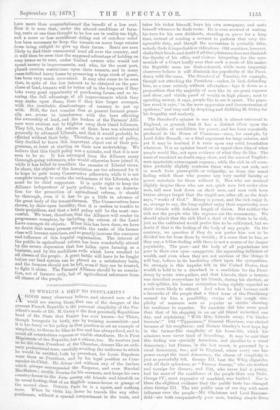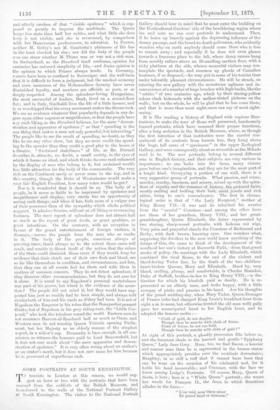IS WEALTH A HELP TO POPULARITY P
AGOOD many observers believe, and shrewd men of the world are among them, that one of the dangers of the present French Republic is the personal simplicity of the Pre- sident's mode of life. M. Gravy is the first genuinely Republican head of the State that Franco has ever known—for Thiess, though bourgeois by birth, was by training monarchist—and it is his fancy or his policy in that position to set an example of simplicity, to live as he likes to live and has always lived, and to avoid all ostentatious expense or visible stateliness. Ho is First Magistrate of the Republic, but a citizen, too. Ho receives just as he did when President of the Chamber, dresses like an ordi- nary professional man, carefully avoiding the uniforms to which he would be entitled, both by precedent, for Louis Napoleon wore them as President, and by his legal position as Com- mander-in-Chief. He drives out without any of the fanfare which always accompanied the Emperor, and even Marshal MacMahon ; avoids liveries for his servants, and keeps his own country-house in the Jura among old friends and kinsfolk on its usual footing, that of an English manor-house or grange of the second class. Outside Paris he is a squire, and nothing more. When he visits his home he travels like any other gentleman, without a special compartment in the train, and
takes his ticket himself, buys his Om newspaper, and seats himself wherever he finds room. He is even accused of waiting his turn for his own dividends, standing en gums for a long time, instead of sending a servant to perform that very dis- agreeable duty, and though the accusation is probably false, nobody finds it improbable or ridiculous. Old courtiers, however, shake their heads, and doubt if all that plainness does not diminish the dignity of his office, and visitors hungering for the cere- monials of a Court loudly aver that such a mode of life makes the Republic seem too drab-coloured, while more impartial observers believe it will diminish the popularity of the Presi- dency with the mass. The Standard of Tuesday, for example, though not attacking the President—rather, in fact, defending him, as a man entirely without affectation—lays it down as a proposition that the majority of men like to see great expense and show, and visible proof of wealth in high places ; next to spending money, it says, people like to see it spent. The popu- lace revel, it says, " in the mere apparatus and demonstration of opulence," and may end by despising and disliking M. Gravy for his frugality and modesty.
The Standard's opinion is one which is almost universal in England, so general, that it has a distinct effect upon the social habits of candidates for power, and has been repeatedly produced in the House of Commons—once, for example, by Lord John Russell,—as a final argument for large salaries, and yet it may be doubted if it rests upon any solid foundation
whatever. it is an opinion based on an upper-class idea of what people would like, not upon evidence of what they do like. The
mass of mankind no doubt enjoy show, and the mass of English- men appreciate extravagant expense; while the rich in all coun- tries probably slightly contemn those who are not rich, not so much from purse-pride or vulgarity, as from the usual feeling which those who possess any very useful faculty or power entertain for those without it. Men who are musical slightly despise those who are not, quick men fret under slow men, tall men look down on short men, and men with keen brains always forget that the stupid are, after all, as the Arab says, ¶' works of God." Money is power, and the rich enjoy it, as, strange to say, the long-sighted enjoy their superiority over their friends with deficient length of vision. But neither the rich nor the people who like expense are the community. We should admit that the rich liked a chief of the State to be rich, just as the cultivated would prefer him to be cultivated, but we doubt if that is the feeling of the body of any people. On the contrary, we question if they do not prefer him not to be divided too far from them by wealth ; if a sense that he has, as they say, a fellow-feeling with them is not a source of far deeper popularity. The poor—and the body of all populations arc poor in their own eyes—exaggerate the separating influence of wealth, and even when they are not envious of the things it will buy, believe in its hardening effect upon the sympathies. So strongly is this impulse felt in the United States, that wealth is held to be a drawback in a candidate for the Presi- dency by acute wire-pullers, and that Lincoln, then a lawyer, was described everywhere by his friends, during his election, as a rail-splitter, his former occupation being rightly regarded as much more likely to attract. And when he had become such a favourite of the people that a third term of the Presidency seemed for him a possibility, stories of his rough sim- plicity of manners were as popular as stories showing his readiness in repartee. No anecdote did him more good than that of his stepping in on an old friend uninvited one day, and explaining, " With Mrs. Lincoln away, l'm kinder browsin'." Old " Tippecanoe," General Harrison, was elected because of his roughness ; and Horace Greeley's best hope lay in the farmer-like simplicity of his home-life, which his admirers were never tired of describing, it may be said that this feeling was specially American, and peculiar to a rural democracy ; but France, in the last resort, is governed by a rural democracy, too ; and in England, where every one has power except the rural democracy, the charm of simplicity is just as powerfully felt. George III. beat the Whig oligarchs, with all their splendour, as " Farmer George," who ate mutton and turnips for dinner ; and Pitt, who never had a penny, had far more of the confidence of the people than any Duke. George 1Y., most expensive of mankind, was loathed. Nor is there the slightest evidence that the public taste has changed since George III. The two public men of our day with most influence over the people—Mr. Gladstone and Lord Beacons- field—arc both comparatively poor men, leading simple lives, and utterly careless of that "visible opulence" which is sup- posed so greatly to impress the multitude. The Queen keeps less state than half her nobles, and what little she does keep is not visible, and she is reverenced, by comparison with her Hanoverian predecessors, to adoration. In France, neither M. Gravy's nor M. Gambetta's plainness of life has in the least checked his rise ; nor did the body of the people sire one straw whether M. Thiers was or was not a rich man. In Switzerland, as the Standard itself confesses, opinion for centuries has enforced simplicity of life,—and Swiss opinion is the opinion to which France always tends. In Germany, clreers have been so confined to Sovereigns and the well-born that it is difficult to form a judgment, but the marked economy and even meanness of the Hohenzollern dynasty have never diminished loyalty, and nowhere are officials so poor, or so deeply respected. Among the splendour-loving Hungarians, the most successful of leaders, Deak, lived on a second-floor flat ; and in Italy, Garibaldi lives the life of a little farmer, and is so worshipped that his every movement makes the throne rock. We see no evidence whatever that popularity depends in any de- gree upon either expense or magnificence, or that the people have aly such liking, as the Standard believes, for the mere "demon- stration and apparatus of opulence ;" or that " spending is the one thing that makes a man not only powerful, but interesting." The people like to see the result of spending, no doubt, as they like to see any other show, but they no more credit the spend- ing to the spender than they credit a good play to the lessee of a theatre. " Sustained stateliness " of life, as Mr. Disraeli describes it, attracts, no doubt, a small society, in the eyes of which it forms an ideal, and which thinks its own rank enhanced by the display of men who belong to it, but sustained wealth has little attraction for the body of the commonalty. The very rich on the Continent rarely or never come to the top, and in this country, though the Duke of Westminster would make a very fair English President, how many votes would he get ? Nor is it wonderful that it should be so. The body of a people, be it never so liable to be impressed by opulence and magnificence' and display, very rarely has an opportunity of seeing such things, and when it has, feels more of a vulgar awe of their possessor than of the sympathy which elicits political support. Tt admires liveries, without at all liking or reverencing footmen. The mere report of splendour does not attract half as much as the report of great deeds, or great qualities, or great intentions. On the contrary, with an exception in favour of the grand entertainment of foreign visitors, it dismays,—severs the people from the man who so exults in it. The body of the people, conscious always of pressing cares, timid always as to the extent those cares will reach, and unable to divest itself of the notion that the rulers of the State could diminish those cares if they would, long for evidence that their chiefs are of their own flesh and blood, are so far like themselves in condition, and circumstances, and fate, that they can at all events feel for them and with them in matters of common concern. They do not detest splendour, if they discover other recommendations, but they do not care for it alone. It is usual to say Napoleon's personal wastefulness was part of his power, but where is the evidence of the asser- tion P The people did not mind it, but they would have sup- ported him just as readily had he been simple, and always told stories both of him and his uncle as if they had been. It is not of Napoleon the Emperor in his robes that the Bonapartist peasant thinks, but of Napoleon in his grey riding-coat, the "Little Con paral," who took the tricolour round the world. Eastern men do not reverence Haroun-al-Rascheed half as much as Omar, and Western men do not worship Queen Victoria opening Parlia- ment, but her Majesty as an elderly woman of the simplest aspect, in a widow's cap. Humanity is base enough, in all con- science, as witness the honours paid to Lord Beaconsfield, but it does not care much about " the mere apparatus and demon- stration of opulence." It is very often wrong about an author's or an orator's merit, but it does not care more for him because he is possessed of superfluous cash.



































 Previous page
Previous page